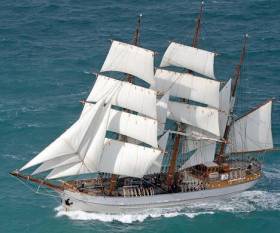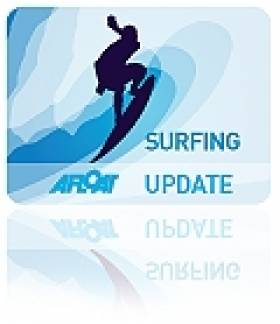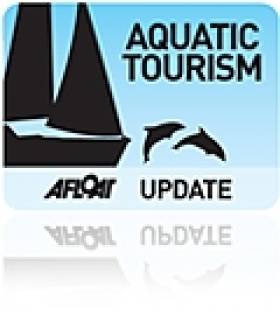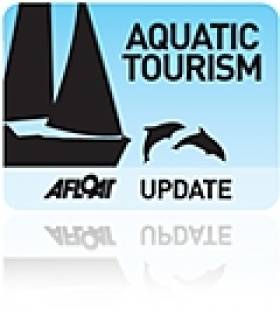Displaying items by tag: activities
#MaritimeFestivals - How often have you admired the River Foyle but wondered what the walled city must look like from out on the water? Whether it’s swimming across it, flying above it or sailing along it, your options are endless at this year’s Foyle Maritime Festival.
Opportunities abound thanks to the packed programme put together by the Loughs Agency in association with Derry City and Strabane District Council.
Kevin Wilson, Director of Development with the Loughs Agency said: “The Loughs Agency is looking forward to the Maritime Festival as an opportunity to highlight the potential of the Foyle for the development of marine tourism. A range of exciting trips and taster sessions has been arranged, in partnership with local activity providers, to showcase what can be enjoyed on the river (canoeing, sailing, paddle boarding)!”
First up is the Foyle Safari from July 14 – 21. Three times a day, Inish Adventures is offering river safaris to take in the historic sights of Derry – from the river, of course - in two large open canoes accommodating up to 24 people. Or you can join them for a sailing taster session under the guidance of experienced instructors for either a group or individual activity.
Far and Wild are offering two very different experiences on the water. The Foods of the Foyle tour will travel by canoe along Lough Foyle on a two hour historical and gastronomical tour which will include a wild camping experience as well as savouring local produce. Alternatively, the stand up paddle board yoga sessions will see you swap a yoga mat for a paddle board – but no experience of either yoga or stand up paddle boarding is required. All you need is an open mind to try something new. Both activities depend on the tide but pre-booking is essential.
If you’re not content with just being on the water and would prefer to be in the water, City of Derry Swimming Club has organised a swim in the River Foyle with around 100 participants taking to the open water on the penultimate day of the Festival, July 21st.
For the ultimate ‘getting away from it all’, join Foyle Paddlers on the evening of Thursday, July 19th for the festival favourite ‘Twilight Paddle’. Deck your canoe and yourself with lights and glow sticks and illuminate the river as part of a large group that receives a great welcome at the marina. There are just two departures, at 7 pm and 8.30 pm, so booking is essential.
Even if you’re not feeling adventurous enough to try out some of the trips, you can still experience life on-board a boat by taking in the Clipper 70 Experience (over 18s only) or the free Clipper 2017-18 Race Fleet Open Boat tour where crew members will give tours and talk about their time sailing the ocean waves.
Two of the Tall Ships will also be docked along the riverside for anyone who wants to enjoy an older style of sail. The Phoenix, star of countless TV and movie productions, returns while the Kaskelot makes its Foyle Maritime Festival debut. Visitors can explore the ‘mini museum’ while finding out what skills it takes to sail and maintain such a ship. The crew will be on hand to answer questions.
Jessie Atkinson, Ship Operations Manager, said: “We are very excited to be bringing Kaskelot to Foyle for the Maritime Festival 2018. It is a particular treat to be coinciding with a stopover for the Clipper Race yachts, an opportunity to see traditional and modern sailing vessels side by side. We look forward to dropping our gangway and opening for visitors – see you there!”
But if you really can’t be convinced to set foot on a boat, then enjoy watching the Foyle River Races from dry land. This new and exciting event has been developed for the festival by the Loughs Agency in partnership with rowing, canoeing, sailing and open water swimming clubs across the Foyle area. Live commentary will be provided for each of the races with Prize Giving Events in the Festival Village afterwards.
Or for the ultimate spectator sport, what about watching adrenaline junkies soar into the sky on their jet packs? Some of the world’s finest flyboard riders will cruise through the air along the riverfront from Thursday 19th until Sunday 22nd.
Flyboard Fun said: “We are thrilled and honoured to be a part of the Foyle Maritime Festival 2018 and we cannot wait to see the excitement in people’s eyes, seeing us jet up to the sky, soar through the air and high-five people in the crowd. We like to ‘involve’ the visitors so that they too feel part of the show.”
After the exhaustion of all that activity – or spectating – you can collapse on the beach; the city beach, that is, which will be located along the quay so don’t forget to bring a bucket and spade!
Helena Hasson, Festival Co-ordinator with Derry City and Strabane District Council, said: “Foyle Maritime Festival promises to put the spotlight on our magnificent River Foyle and there is a packed programme of activities to ensure as many people as possible have the opportunity to get out on the water and enjoy our greatest asset. With a range of free and low-cost events appealing to a wide age-range, there is always something to appeal in the festival programme which you can find on our website.”
Please check the festival website here for information on start times, durations, prices and booking tickets for all events. Note that a minimum age restriction may apply in the interests of safety and supervision. Pre-booking is highly recommended.
Surfing Novices Welcome in the Sunny Algarve
#SURFING - Rachel Collins writes in The Irish Times recently of her experiences learning to surf in Portugal's sunny Algarve.
"Thousands of hardy souls follow the waves around the Irish coastline," she writes, "but for rookies sacrificing themselves to the sea, the warmth of the Algarve makes it the perfect place to learn."
The "friendly, welcoming atmosphere" at Lagos, near Faro - with direct daily flights from Dublin - will surely put any surfing beginner at ease, as well as making for "a welcome break from the cold Irish winter".
And with plenty of other activities on offer, from the nightlife, shopping, fine dining and relaxing sandy beaches to kitesurfing, wakeboarding, mountain biking and rock climbing, there's something for all interests.
The Irish Times has more on the story HERE.
Cork The Place to Be For a Holiday On The Sea
#TOURISM - Winter might be upon us, but it's a great time to plan a new year holiday in Ireland on the sea, according to the UK's Daily Echo.
From night-time paddling in with renowned kayaking instructor Jim Kennedy, to snorkelling in Baltimore, relaxing in Skibbereen and and fresh seafood lunches in Kinsale, a vacation in Cork can appeal to any taste.
Whale and dolphin watching is a big draw for the region, too, as Ireland's coast – the first cetacean sanctuary in Europe - plays host to a growing variety of species.
The summer feeding grounds off the southern coast are particularly busy, and tourist boats are often treated to whales breaching the surface and surrounded by dolphins putting on a show.
The Daily Echo has more on the story HERE.
Fun On The Water You May Not Have Tried
This week The Irish Times highlights a host of water-based activities that you may not have tried.
From kitesurfing to paddle boarding, urban fishing to SCUBA diving and even moonlight kayaking, there's surely a new experience for everyone from the most veteran sea dog to the driest landlubber.
The Irish Times has more on the story HERE.



























































